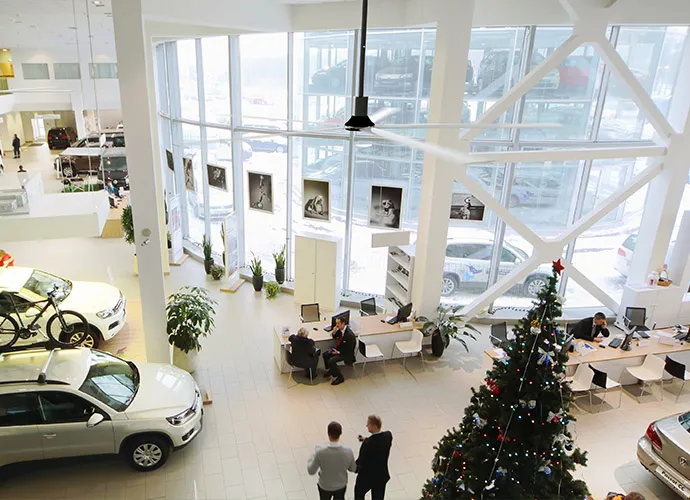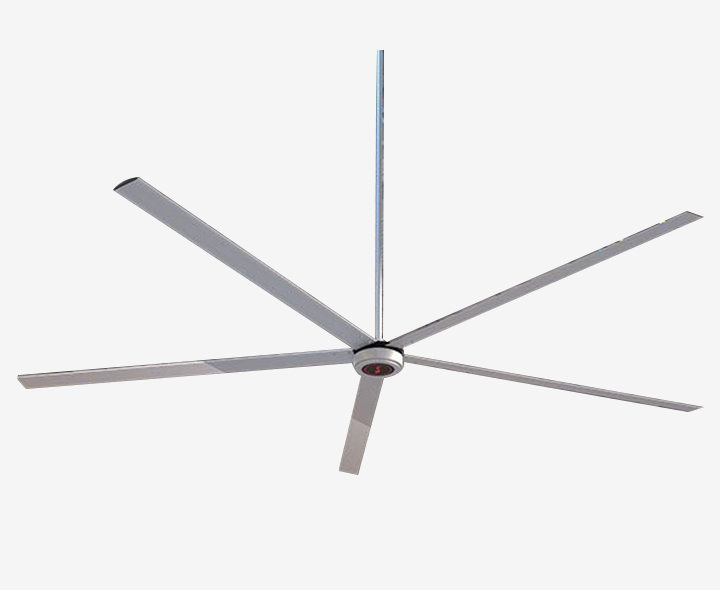Hot air lingers, floors feel stuffy, and energy costs climb. People slow down. Equipment struggles. The fix is simple: use industrial fans that move large volumes of air so teams stay cool and work safer.
Short answer: A high volume low speed hvls fan spreads a broad breeze that evens out temperature, boosts comfort, and trims HVAC runtime in industrial and commercial buildings. Compared with many small units, one properly sized industrial fan can deliver strong comfort with lower energy consumption and easier control.

High-Efficiency Industrial HVLS Fan for large spaces
An hvls fan is a very large ceiling fan that turns at low speed to move air gently across a big floor. Because the disk is large, it pushes impressive amounts of air with a calm, even breeze that people like. In tall buildings and large spaces, these units mix hot layers near the ceiling with cooler air below so temperatures feel even. This steady airflow also aids ventilation by distributing fresh air where people work. Reputable field notes and manufacturer guidance document how HVLS units serve warehouses, gyms, and plants by mixing air efficiently.
Why it matters: broad coverage, fewer penetrations, and quieter comfort compared to banks of small fans.
Quick spec cue: In many open halls, one large unit can influence well over 15,000 ft²; larger diameters extend reach with less draft.
Yes—felt comfort drives focus. The light breeze encourages evaporation, so people feel cooler without extra tonnage. That lets teams raise the set-point while keeping the same comfort, supporting energy savings and reliable work pacing. Documented projects show year-round benefits when HVLS is paired with HVAC. (Hunter Industrial)
Mini table: how comfort shows up in outcomes
| Outcome driver | What changes | Why it helps |
|---|---|---|
| Even temperature | Less overheating, less stale air | Fewer hot/cold pockets and complaints |
| Felt cooling | Skin evaporation | Same comfort at higher set-points |
| Safer floors | Faster surface drying | Lower slip risk near lines |
For open bays, docks, and courts, large commercial fans (HVLS) deliver whole-floor mixing. For workstations, racks, or tight spaces, industrial high-velocity fans focus a jet where people stand.
At a glance
| Use case | Best choice | What you get |
|---|---|---|
| Tall, open industrial hall | HVLS | Wide airflow across the space, balanced comfort |
| Packing stations | Directional jets | Focused throw on people and machinery |
| Mixed | Blend both | Whole-floor mixing plus spot relief |
In short, pick HVLS for broad air circulation and jets for task circulation. When you combine them correctly, you create a more comfortable environment with fewer units and fewer cords on the floor.

large commercial fans (HVLS)
Warm air pools near the roof in winter. Destratification fans push it down, so heaters run less. In summer, the breeze makes people feel cooler, reducing compressor cycles. Many documented projects report up to ~30% heating reduction in tall buildings and meaningful cooling relief with the same installed AC.
Bottom line: Mix heat in winter; ease air conditioning load in summer. That’s how projects cut energy costs without major duct work.
Two proven paths:
As a hvls fan manufacturing plant, we build both; we match drive to duty, noise goals, and budget so fans are designed for your real-world use.
Short table: drive selection
| Factor | Direct drive | Gear |
|---|---|---|
| Noise | Very low | Low-moderate |
| Torque need | Moderate | Very high |
| Service | Minimal | Periodic checks |
| Best for | Education, show floors | Large industrial bays |
Coverage matters more than speed. Large diameters deliver powerful airflow with fewer watts. For example, vendor docs cite a 24-ft unit creating a 6–8°F cooling effect across ~23,000 ft²—illustrating throw of air over long distances. Always check rated cfm per watt and validate with a simple layout sketch.
Rule-of-thumb sizing (illustrative)
| Clear height | Typical fan Ø | First-pass count | Notes |
|---|---|---|---|
| 20–28 ft | 12–16 ft | 1 per 10–12k ft² | Avoid racks and cranes |
| 28–36 ft | 16–20 ft | 1 per 12–18k ft² | Check column shadows |
| 36–45 ft | 20–24 ft | 1 per 18–23k ft² | Verify coverage zones |
A smart controller links to BAS, schedules seasons, and listens to sensors. Reverse for winter mixing; forward for summer relief. Interlock with doors, lifts, or cranes. With the right logic, fans help create better paths for fumes and improve air quality perception while you optimize runtime.
Pro tip: add start-up limits near hoists and use “lockout” inputs during maintenance.
We’ve helped manufacturing facilities stabilize comfort in high temperatures with even mixing over lines and machinery. Results include fewer hot-spot alarms, less stale air, and more stable environment readings across the workspace. In school gyms, the breeze helps reduce humidity at occupant level and dries floors faster, improving footing.
Before/after snapshot
| Metric | Before | After HVLS |
|---|---|---|
| Complaints per week | Higher | Lower |
| Surface moisture events | More | Fewer |
| Felt comfort | Uneven | Even |
When you research, you’ll see Big Ass Fans for deep design tools, Hunter Industrial for ROI content, and Patterson for rugged lines and examples of broad coverage. As an objective note, each publishes useful calculators and case notes you can learn from.
Alongside those peers, vindus fan focuses on airflow solutions that are simple to commission, customizable to your roof geometry, and easy to maintain over time. Buyers also compare specs from fans at industrial fans direct and sometimes simply shop industrial catalogs to benchmark diameters, drives, and controls.
Our position: we are a wide range manufacturer who engineers clean installs with verified coverage and straightforward service paths.

Vindus HVLS fans
How do HVLS units make people feel cooler if the air temperature is the same?
They increase evaporation on skin. That breeze improves comfort so you can hold set-points higher while maintaining the same feel, which helps reduce energy use.
Can HVLS replace AC?
Not always. Think “partner,” not “replacement.” HVLS mixes air and eases load so HVAC runs less. In many halls it’s the best first step before adding more air conditioning.
Where do I start in a warehouse?
Begin with a sketch of aisles, docks, and obstructions. Validate coverage using vendor calculators and confirm cfm per watt. One large unit can serve a broad zone; add directional jets for stations.
Will fans hurt indoor air quality?
Correctly specified systems improve air quality perception by diluting heat layers and aiding ventilation to exhaust. Keep filters clean and balance make-up air.
Do I need special training to run the system?
A modern controller makes operation simple. We pre-load seasonal presets and tie interlocks to doors or cranes to keep people safe and the system efficient.
Our industrial hvls fans are fans are designed to move massive amounts of air in tall buildings and industrial halls. In hot months, the mild breeze helps people stay cool while lowering energy consumption; in cold months, destratification fans blend roof heat to the floor. In industrial settings, those moves improve air balance across lines and racks. When you run the system at low speed, it can circulate comfort with minimal noise and push airflow across bays and aisles. The result is steadier airflow solutions and better air movement where people work.
Directional units remain useful; industrial high velocity jets help in tight spaces that the big rotor can’t reach. For procurement, teams often compare large commercial fans and check brands like Hunter Industrial, Patterson, and Big Ass Fans; you might also see listings that say “fans at industrial fans direct.” If you like to shop industrial catalogs, we’ll still support you with an engineer review and a site walk. Because these systems move air efficiently, they can move large volumes of air and send air over long distances. That boosts comfort around machinery and supports a safer environment and better air quality.
If your factory has high temperatures and slick floors, our plan can reduce humidity at the occupant level and help fans help housekeeping. The equipment is heavy duty, but gentle on people, truly long-lasting, and available with customizable controls. As you consider brands, remember that hvls fans can improve comfort in manufacturing facilities and large industrial halls with powerful airflow and reliable coverage when the spec uses the right controller, direct drive or gear as needed, and a layout with proper air paths. That’s how we create a more comfortable environment and reduce energy waste with air movement solutions built for industrial and commercial fans users.

Hi, I’m Michael Danielsson, CEO of Vindus Fans, with over 15 years of experience in the engineering and design industry. I’m here to share what I’ve learned. If you have any questions, feel free to contact me at any time. Let’s grow together!